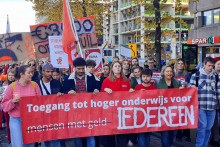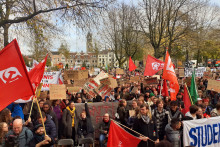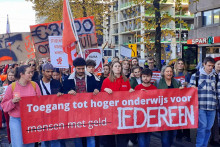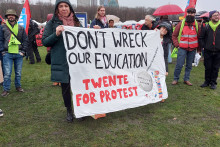Who: Wouter Eppink (30)
Study: Master Mechanical engineering
'I'm going to protest for the first time in my life. With my studies I focus on current climate problems. I like to solve problems myself and that is why it is not in my character to stand on a square with a protest sign. But with these cuts to education, I can only contribute by traveling to Utrecht to protest.'
'The cuts discourage people who are not well off financially from studying. It is made extremely difficult for them. Personally, the cuts also affect me. I will graduate in six months and I am considering doing a PhD afterwards. I want to get the most out of my PhD. The cutbacks make that choice uncertain. What will PhD supervision be like in the future if politicians cut back on employees, for example? The question is also whether I am building a good and strong network. In addition, I am afraid that many high-tech companies will leave the Netherlands after ten years. We have a strong economic position internationally, but the cutbacks are doing our country no good.'
Who: Kristy Claasen (39)
PhD: Philosophy of Technology
'I come from South Africa and I notice that the people in Twente are somewhat reserved and do not easily make themselves heard. I think it is very important to draw attention to current political topics and upcoming cuts. This is why I started the WhatsApp group 'Twente for Protest' with the help of colleagues. This grew into an active group with hundreds of people. I didn't expect the group to become so big. I hear from the protest group at the university in Utrecht that they are surprised that Twente is now this vocal.'
'I'm doing a PhD and I notice that the atmosphere at the UT is changing. People are anxious and worried. For example, about job guarantees, the long-study fine and about the content of education. The'atmosphere' is changing on campus. The cuts also have negative consequences for PhD candidates. I got a scholarship years ago. If I had not received that, it would not have been possible for me to work at the UT. It is painful to see that PhDs are being hit hard due to  budget cuts. It is an investment of years and as a country you will completely lose that knowledge if the budget cuts continue. Someone with a completed PhD immediately leaves for another country, because the Netherlands is becoming less attractive.'
budget cuts. It is an investment of years and as a country you will completely lose that knowledge if the budget cuts continue. Someone with a completed PhD immediately leaves for another country, because the Netherlands is becoming less attractive.'
'The country is aware of this. The beautiful and strong identity of the Netherlands in the field of education is deteriorating due to budget cuts. The Netherlands is also a major leader in technology. I wonder if it will remain that way.'
'To bring as many people as possible to Utrecht, we have set up a crowdfunding campaign to raise money. This way, international students - who, for example, do not have a public transport card - can also go to Utrecht. The Student Union organizes bus trips. I am very curious how many UT students will eventually go to Utrecht. I hear from many people that they are protesting for the first time.'
'With this protest I hope, of course, that the cuts will go completely off the table. I don't see that happening. But for the long term, I want us to be listened to. That is why we must make ourselves heard. Even after 14 November, I will continue to protest and I want to make the protest group bigger.'
Who: Ryan Wakamiya (36)
ECIU University & Internationalisation
‘I do not expect this protest to trigger political changes immediately. The protest is not the solution to the problem. Instead, it is only a small part of working continuously to put pressure on the leaders and decision-makers.’
‘Nevertheless, we must be present with a large crowd to make ourselves heard. That is
Who: Annick Bijlsma
President Student Union
'These cuts affect me personally, because it makes it more difficult to do something besides your studies. Through  the associations I am a member of and the committees I did, I made many new friends. I also learned a lot and laughed a lot. In my opinion, you need that variety to study efficiently. In addition, I learned various skills that you don't learn in a study. With the increasing pressure on students and measures, such as the long-term study fine, you are depriving students of that opportunity.'
the associations I am a member of and the committees I did, I made many new friends. I also learned a lot and laughed a lot. In my opinion, you need that variety to study efficiently. In addition, I learned various skills that you don't learn in a study. With the increasing pressure on students and measures, such as the long-term study fine, you are depriving students of that opportunity.'
'I also find it worrying that in the short term, the quality of education is likely to deteriorate, while as a student you pay more. That's strange, isn't it? In addition, I think the long-term consequences of these cuts are important. Because while the EU is calling for more investment in education in order to remain competitive, the government decides to cut costs. I think education is an investment in the future.'
'My entire board (Bijlsma is also chair of the Student Union, ed.) and a number of friends are going to Utrecht. I try to activate as many people around me as possible to come along. I want to make it clear to the government how hard it affects the students. The best outcome of this protest would be that the government cuts back less. I'm afraid this is going to be very difficult.'






